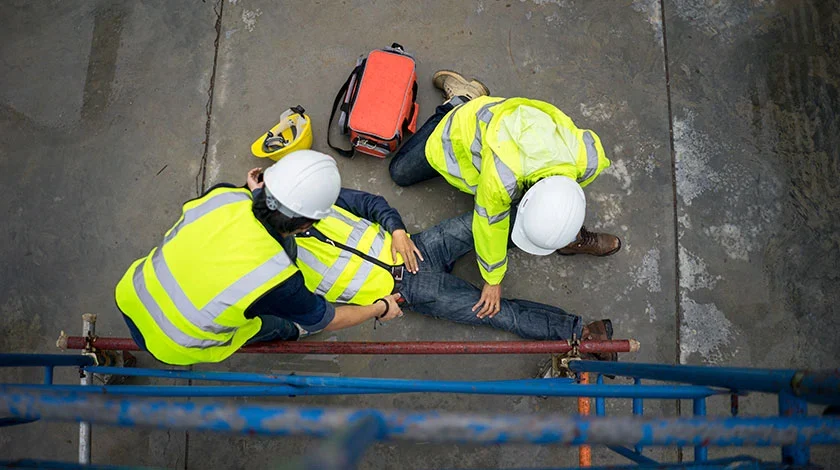Labour hire arrangements
Many employers (host employers) engage employees of labour hire companies, particularly in the building and construction, hospitality and manufacturing industries. provide flexibility, reduced admin responsibilities, and increased access to diverse and skilled workers. However, what happens when one of these employees gets injured at the host employer’s work site? Who is liable for the injuries?
What obligations are owed?
The Work Health and Safety Act 2011 (NSW)(WHS Act)(s 19) imposes a primary duty of care on a person conducting a business to any workers. The must ensure the health and safety of workers by:
- creating a safe work environment,
- providing safe plant and equipment,
- ensuring safe work systems are provided,
- providing adequate information, training and supervision to protect workers, and
- monitoring workplace conditions to avoid injury.
The WHS Act (s 7) defines workers broadly and captures employees of labour hire companies, meaning the host employer owes a duty of care outlined above to these employees.
A recent decision is instructive on this point, where the host company and the labour hire company were held jointly liable, in proportions of 75% and 25% respectively, for injuries sustained by a labour hire employee on site.
Carey-Schofield v Hays & Civeo [2024] QSC 60
The recent case of Carey-Schofield v Hays & Civeo [2024] QSC 60, demonstrates the imposition of the duty on host employers.
Mr Carey-Schofield was hired by the labour-hire company, Hays Specialist Recruitment (Australia) Pty Ltd (Hays), to work for the host employer, Civeo Pty Ltd (Civeo).
Civeo engaged Mr Carey-Schofield through Hays to maintain Civeo’s accommodation village at Dysart in Queensland. Mr Carey-Schofield was required to complete tasks such as changing bin liners and taking full rubbish bags to the bin using a utility vehicle.
Nine days into his role, while changing the bins, a wasp caused Mr Carey-Schofield to stumble backwards over rubbish bags on the floor. He fractured his elbow.
Mr Carey-Schofield failed to follow Civeo’s procedure that required him to change each bin one-by-one and load it onto the utility vehicle. Instead, he accumulated the full bags onto the floor before putting them all into the utility. He did this as the first bin bag was too heavy to lift into the utility, requiring the assistance of another employee.
Mr Carey-Schofield sued Civeo and Hays for negligence.
The Supreme Court of Queensland considered whether Civeo or Hays was liable for a breach of their duty of care to Mr Carey-Schofield as a worker.
The court held that Civeo and Hays had both breached their duty of care to Mr Carey-Schofield. The court highlighted that the duty to ensure precautions are taken to provide a safe work environment is non-delegable. It found that the risk that the rubbish bags could be too heavy and be a tripping hazard if left on the ground was foreseeable and significant. Significantly, the court found Civeo to hold 75% of responsibility for the injury and Hays to hold 25%.
How can host employers minimise their liability exposure?
Host employers must take precautions to ensure the health and safety of labour hire workers and limit their liability for injuries at work.
The importance of contract terms with the labour hire company
Host employers will enter contractual arrangements with labour hire companies, setting out the conditions of the working arrangement. Host employers must seek legal advice to review the contractual terms of their agreements to minimise the risk of overexposure to liability.
One important term to look out for is an indemnity clause. This indemnifies the labour hire company from risk, transferring it to the host employer. These clauses are problematic, especially since the labour hire company holds the workers’ compensation insurance. Host employers should seek legal advice regarding the terms of their contracts.
The importance of ensuring insurance is right
Host employers will hold public liability insurance, covering liability for injuries and damage caused to and by assigned employees. Host employers can often fall into the trap of being uncovered by public liability insurance when labour hire employees make claims. To ensure proper disclosure is provided, host employers must add a notation to their public liability insurance policy, highlighting that the employer engages labour hire employees. Such disclosure will ensure that they cover incidents involving these workers.
Practical tips for host employers
Under WHS law, labour hire employees are workers and therefore host employers must implement risk elimination and minimisation mechanisms.
Employers should take the following initiatives:
Inductions
Before work commences, ensure a proper induction is carried out, advising the workers of policies and procedures, workplace hazards and expectations.
Training
Regular training is needed to ensure staff have the requisite skills and are up-to-date with procedures. Training should identify potential risks in the workplace and minimise them by teaching staff how to deal with them. Training should advise staff on how to complete necessary tasks safely and records should be kept of completed training. Regular toolbox talks are also recommended to ensure safety messages are communicated to all workers.
Supervision
Employers should arrange for work sites to be regularly supervised to ensure that employees take proper safety precautions.
Policies
Ensure that your business implements thorough policies and procedures that describe the proper conduct for each task.
Don’t set and forget
Employers should regularly review their safety and training settings to ensure compliance with their WHS duties to all workers.














